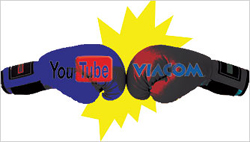Appeals Court Gives Viacom Second Shot At YouTube
- by Wendy Davis @wendyndavis, April 5, 2012

In a mixed ruling, a federal appeals court on Thursday revived Viacom's copyright infringement lawsuit against Google's YouTube.
The Second Circuit Court of Appeals ruled that Viacom had presented enough evidence against Google that the case shouldn't have been dismissed before trial.
"A reasonable jury could find that YouTube had actual knowledge or awareness of specific infringing activity on its Website," the Second Circuit Court of Appeals said in a 39-page opinion that vacated U.S. District Court Judge Louis Stanton's decision granting Google summary judgment.
The appellate court returned the lawsuit to the district court in New York, where both sides will once again have the opportunity to present evidence and argue their positions.
But the Second Circuit also sided with Google on a key issue, ruling that the company couldn't be held liable based solely on the "general knowledge" that its users were infringing copyright. That portion of the decision could prove helpful to Google when the case returns to court, according to some legal experts.
"Google avoided any holdings that would have been an absolute loss for it," says James Grimmelmann, a professor at New York Law School.
The long-running lawsuit dates to 2007, when Viacom alleged that YouTube infringed copyright by allowing users to post tens of thousands of pirated clips. Google countered that it was protected by the safe harbor provisions of the Digital Millennium Copyright Act, which broadly state that sites are immune from copyright infringement liability for material uploaded by users, as long as the sites remove the material upon request.
But those safe harbors have some exceptions, including one for companies that know they host pirated clips. Viacom contended that Google should be held liable -- on the theory that it knew of infringement in general on its site and didn't prevent it.
The Second Circuit disagreed with Viacom's interpretation on that point, ruling that Google was eligible for the safe harbor, as long as it removed specific URLs upon request. "Expeditious removal is possible only if the service provider knows with particularity which items to remove," the appellate court ruled.
Grimmelmann says that portion of the opinion is especially helpful to YouTube. "On the crucial question of specific knowledge, Google won," he says.
But the appellate court also ruled that Viacom presented enough evidence of Google's specific knowledge to warrant a trial. That evidence included a report prepared in March 2006 by YouTube founder Jawed Karim, which said that clips of "well-known shows," including "Family Guy," "South Park," and "MTV Cribs," were present on the site.
The appellate court additionally said that Google couldn't claim the safe harbors if it was "willfully blind" to infringement on YouTube.
The decision left both sides claiming victory. “We are pleased with the decision by the U.S. Court of Appeals. The Court delivered a definitive, common sense message -- intentionally ignoring theft is not protected by the law.”
For its part, Google stressed that the appellate court "upheld the long-standing interpretation of the DMCA and rejected Viacom's reading of the law." The company added the ruling won't have an impact on how YouTube operates.


